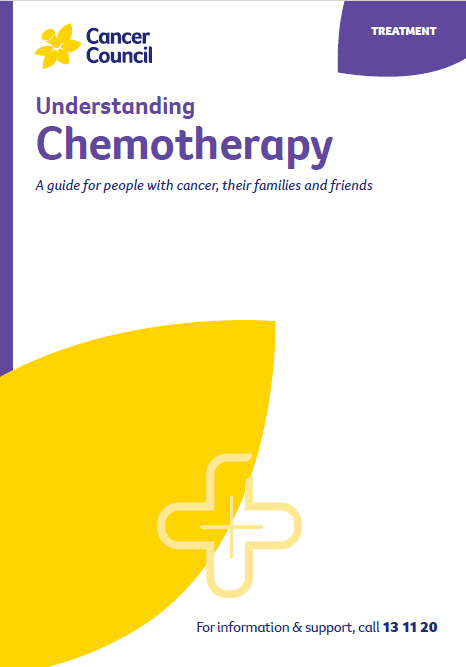- Home
- Bladder cancer
- Muscle-invasive bladder cancer treatment
- Systemic chemotherapy
Systemic chemotherapy
Chemotherapy uses drugs to kill or slow the growth of cancer cells. The aim is to destroy cancer cells while causing the least possible damage to healthy cells.
Learn more about:
- Overview
- When is systemic chemotherapy used?
- Having systemic chemotherapy
- Side effects of systemic chemotherapy
- Video: What is chemotherapy?
Overview
For muscle-invasive bladder cancer, drugs are injected into a vein (intravenously). As the drugs circulate in the blood, they travel throughout the body. This type of chemotherapy is called systemic chemotherapy. It is different to the intravesical chemotherapy used for superficial bladder cancer, which is delivered directly into the bladder.
When is systemic chemotherapy used?
Systemic chemotherapy for muscle-invasive bladder cancer is used:
- before surgery (neoadjuvant chemotherapy) – to shrink the cancer and make it easier to remove; it can also lower the risk of the cancer coming back
- after surgery (adjuvant chemotherapy) – if there is a high risk of the cancer coming back.
How chemotherapy is given
You will see a medical oncologist to plan your chemotherapy treatment. Chemotherapy is commonly given as a period of treatment followed by a break. This is called a cycle. In most cases, you will have several cycles of chemotherapy over a few months. Usually, a combination of drugs works better than one drug alone. The drugs you are offered will depend on your age, fitness, kidney function and personal preference.
Systemic chemotherapy can sometimes be combined with radiation therapy (chemoradiation) as part of trimodal therapy. Systemic chemotherapy may also be used for bladder cancer that has spread to other parts of the body.
Side effects of systemic chemotherapy
The side effects of chemotherapy vary. They may include:
- fatigue
- nausea and vomiting
- constipation
- mouth sores
- taste changes
- itchy skin
- hair loss
- ringing in the ears
- tingling or numbness of fingers or toes.
Side effects usually last for only a few weeks or months, although some can be permanent. Talk to your doctor about ways to reduce your risk or manage any side effects you develop.
During chemotherapy, you may be more prone to infections. If you develop a temperature over 38°C, contact your doctor or go immediately to the emergency department at your nearest hospital.
Learn more about chemotherapy.
→ READ MORE: Radiation therapy for bladder cancer
Video: What is chemotherapy?
Watch this short video to learn more about chemotherapy.
Podcast: Making Treatment Decisions
Listen to more episodes from our podcast for people affected by cancer
More resources
Dr Prassannah Satasivam, Urologist and Robotic Surgeon, Epworth Hospitals and Cabrini Hospitals, VIC; Donna Clifford, Urology Nurse Practitioner, Royal Adelaide Hospital, SA; Marc Diocera, Genitourinary Nurse Consultant, Peter MacCallum Cancer Centre, VIC; Dr Renee Finnigan, Radiation Oncologist, Gold Coast University Hospital, QLD; Lisa Hann, 13 11 20 Consultant, Cancer Council SA; Dr Andrew Hirschhorn, Director of Allied Health and MQ Health Academy, MQ Health, Macquarie University, NSW; Anne Marie Lyons, Stomal Therapy Nurse, Concord Hospital and NSW Stoma Limited, NSW; John McDonald, Consumer; Prof Manish Patel, Urological Cancer and Robotic Surgeon, Westmead Hospital, Macquarie University Hospital, and The University of Sydney, NSW; Dr Jason Paterdis, Urological Surgeon, Brisbane Urology Clinic, QLD; Graeme Sissing, Consumer; Prof Martin Stockler, Medical Oncologist, The University of Sydney, Concord Cancer Centre, and Chris O’Brien Lifehouse RPA, NSW.
View the Cancer Council NSW editorial policy.
View all publications or call 13 11 20 for free printed copies.

